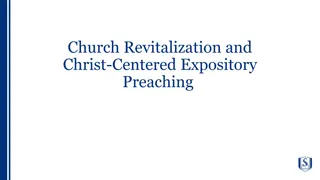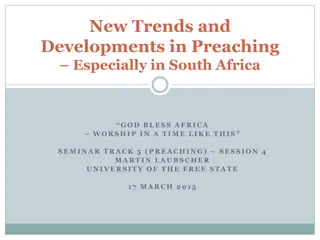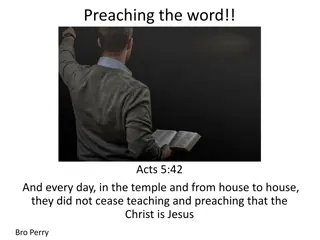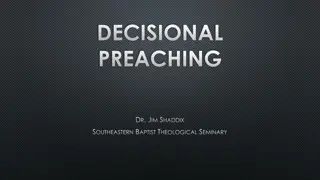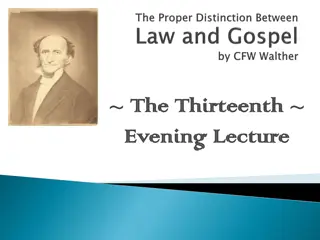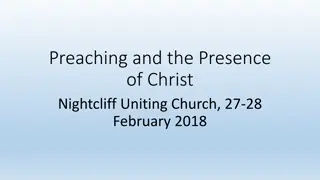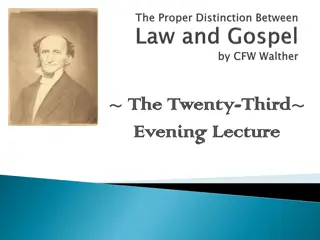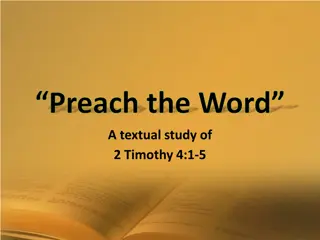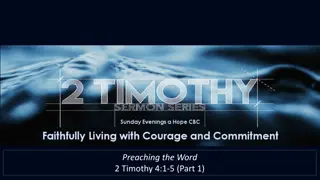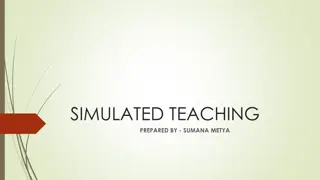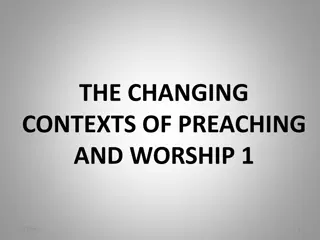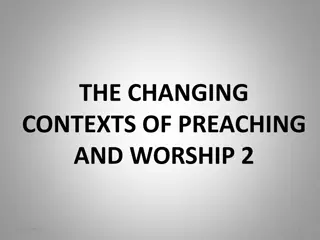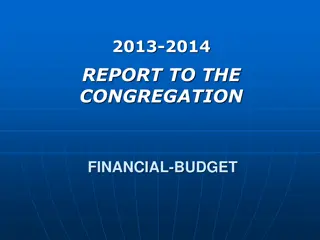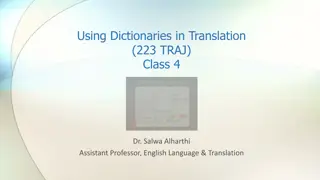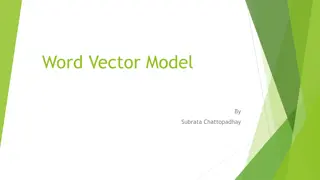Applying, Teaching, and Preaching the Word
This chapter focuses on the practical application of different genres of biblical texts, emphasizing the importance of interpreting and teaching the Word accurately. It discusses the challenges and rewards of applying narrative passages, wisdom literature, epistles/discourses, and prophetic/apocalyptic texts. The content highlights the need for discernment in understanding the underlying spiritual lessons and principles within each genre.
Uploaded on Sep 18, 2024 | 0 Views
Download Presentation

Please find below an Image/Link to download the presentation.
The content on the website is provided AS IS for your information and personal use only. It may not be sold, licensed, or shared on other websites without obtaining consent from the author. Download presentation by click this link. If you encounter any issues during the download, it is possible that the publisher has removed the file from their server.
E N D
Presentation Transcript
Chapter 16 GETTING DOWN TO EARTH: APPLYING, TEACHING, AND PREACHING THE WORD
CHAPTER OUTLINE Application: Genre by Genre Proclamation: From Study to Lesson/Sermon
APPLICATION Interpretive Virtues and the Hermeneutical Triad Rewards of Proper Application & Perils of Neglected Application The Need for Proper Application Establishing Relevance and Legitimacy Appropriating the Meaning Doing Theology
APPLICATION Applying Narrative Passages OT Narrative Complex and indirect Original historical setting Salvation-historical context In light of NT fulfillment NT Narrative Intermediary stage in salvation history Disciples did not possess the indwelling Holy Spirit Application less straightforward Discern underlying spiritual lesson or principle
APPLICATION Wisdom Literature & Parables Wisdom Literature Discern abiding spiritual principles The wise will live in keeping with Creator s instructions The foolish will ignore them and suffer for it Parables Not historical narratives but realistically told stories Discern primary (and sometimes secondary) spiritual lesson taught by parable Go and do likewise
APPLICATION Epistles/Discourses Often application is straightforward (e.g. Love one another ) Some circumstantial, situational passages are embedded (e.g. in Paul s letters to Timothy & Titus) Direct application only possible for original recipients Discern any underlying abiding principles Discern between cultural expression and underlying norm
APPLICATION Prophetic/Apocalyptic Primary function of OT prophets is calling God s people to covenant obedience Interpret in light of original historical setting Interpret in light of literary context (structure) Interpret in light of theological framework God is sovereign Lord of history God will vindicate his saints God will judge unbelievers God will bring about the eternal state
STUDY TO LESSON/SERMON Old Testament Narratives Major Mistakes Be careful not to preach or teach a text while being ignorant of its literary context. Be careful not to impose alien structural divisions on the text. Be careful not to allegorize Old Testament narratives. Be careful not to impose unstated elements onto the narrative. Be ready to address familiar characters from a fresh perspective.
STUDY TO LESSON/SERMON Old Testament Narratives Preaching Old Testament Narrative The controlling philosophy for all that follows is this: the rhetorical structure of your lesson or sermon should be based on the literary structure of your text. Step 1: Identify and interpret the scenes of the narrative cycle. Step 2: Analyze the scenes to determine the span of text for the sermon. Step 3: Determine the structure of the textual unit. Step 4: Design the sermon around the structure of the textual unit.
STUDY TO LEESSON/SERMON New Testament Narratives (Gospels and Acts) Major Mistakes See Old Testament Narrative We must resist preaching a harmony and not the text. We often mistake a description of an event for a command to the church. Preaching New Testament Narratives Step 1: Identify and interpret the scenes and the narrative cycle. Step 2: Analyze the scenes to determine the span of text for the sermon. Step 3: Determine the structure of the textual unit.
STUDY TO LESSON/SERMON Special Genres in Narratives Speeches/Exchanges Step 1: Identify and interpret the scenes of the narrative cycle. Step 2: Analyze the scenes to determine the textual unit for the sermon. Step 3: Determine the structure of the textual unit. Step 4: Design the sermon around the structure of the text.
STUDY TO LESSON/SERMON Special Genres in Narratives Parables Major Mistakes We must not treat parables as historical narrative. We must not domesticate the stories when preaching the parables. Preaching the Parables We should note the function of the parables in the structure of the whole book. The parable often has embedded allegorical principles.
STUDY TO LESSON/SERMON Non-narrative Literature Poetic Literature Major Mistakes We often mishandle the frequent figurative language we find in poetry. We often impose historical situations as the context of the Psalm. We often preach the Psalms coldly, antiseptically, mining it for theological gems when the emotive content is often at the foreground. Sometimes we domesticate the intent of the Psalm. Preaching the Psalms Step 1: Identify the classification of the Psalm. Step 2: Identify the structure of the Psalm. Step 3: Design the sermon around the structure of the Psalm.
STUDY TO LESSON/SERMON Wisdom Literature Major Mistakes First, don t preach a proverb as if it had no time or covenantal constraints. Second, preaching a single proverb and paying no attention to its context is unwise. Third, importing foreign historical or background information is a mistake. Preaching from Proverbs Step 1: Note where your passage is found within the overall structure of the book. Step 2: Identify the type of collection. Step 3: Design your sermon or study around the structure of the text.
STUDY TO LESSON/SERMON Prophecy Major Mistakes We are often completely ignorant of the different elements and/or forms of the prophetic genre. We suffer from certain popular misconceptions about the very nature of the prophet and prophecy. Closely related to this error is the fallacy of understanding the prophet more like a fortune-teller than a biblical prophet. Assuming a chronological arrangement of the individual oracles. To fail to recognize that a given oracle is employing poetry. To misconstrue the actual limits of the oracle.
STUDY TO LESSON/SERMON Prophecy Preaching Old Testament Prophecy Step 1: Determine the limits of the individual oracles and it place in the larger structure. Step 2: Determine the genre and/or subgenre of the oracle and its structure. Step 3: Design the sermon around the structure of the text.
STUDY TO LESSON/SERMON Apocalyptic Literature Major Mistakes When preaching the Book of Revelation, communicators often make the mistake of approaching the text with one and only one interpretive grid. Preaching Revelation strictly from the preacher s own theological framework without acknowledgment that there are other legitimate viewpoints held by respectable scholars and biblical communicators. We spend far too much time trying to figure out when the rapture will occur in the book. We do not make sufficient connections to the Old Testament through the literary visions. We only preach up to chapter 3. Hubris
STUDY TO LESSON/SERMON Apocalyptic Literature Preaching the Apocalypse Step 1: Carefully identify the boundaries of your passage. Step 2: Carefully identify and interpret the Old Testament allusions in your passage. Step 3: Cautiously identify and interpret the symbols in your passage. Step 4: Fit your passage into the overall structure of its context (and book) and identify the passage s structure. Step 5: Design your message around the structure of your passage.
STUDY TO LESSON/SERMON Hortatory and Expository Literature (Epistles and Speeches) Major Mistakes A communicator will often ignore the historical context. We often ignore the literary context. Ignoring the thought flow of the text. We are tempted to preach a theological grid rather than the text. The preacher or teacher will often make his or her study a series of word studies. Preaching Hortatory and Expository Literature Step 1: Identify the structure of the whole letter. Step 2: Analyze the structure to determine the textual unit for the lesson or sermon. Step 3: Examine the text clause by clause. Step 4: Design a lesson or sermon outline from the structure of the text.
CONCLUSION Be submissive: Take on a submissive stance toward Scripture. Do not domesticate Scripture or use biblical interpretation to serve your own ends. Approach Scripture with reverence as the Word of God. Be humble: Don t be dogmatic or arrogant. Focus on issues, not people. Be spiritual: Read 1 Cor 2:10b 16. Ask God to illumine your study of Scripture. Be sensible: Be mindful of the importance of balance. In your interpretation of Scripture, do not go out on a limb. Distinguish between possible, plausible, and probable interpretations. Beware of exegetical fallacies. Be seasoned: Be knowledgeable, develop experience. Be aware of the relevant issues and any potential pitfalls.
CONCLUSION Be committed to proper interpretive procedure: Make the Hermeneutical Triad your own and use it regularly. Look at every passage you study from the vantage point of History, Literature, and Theology. Be intentional and deliberate: Don t be haphazard in your interpretation of Scripture. Good hermeneutics does not happen by chance. It takes careful thought, planning, and effort, and requires the use of a sound interpretive method. Be consistent: Make sure your interpretive outcome and application are coordinated, not arbitrary. If 1 Timothy 3 applies to today, what about 1 Timothy 2? If certain patterns in the Book of Acts apply, what about others?
CONCLUSION Be perceptive: Remember Schlatter s hermeneutic of perception. Be quick to listen and slow to speak (Jas. 1:19; Eccl 5:1 2). Listen to God s Word carefully and aim to perceive what is there. Cultivate the ability of seeing and perceiving. Be conservative: Exercise interpretive restraint. Do not unduly exaggerate, illegitimately extrapolate, or otherwise exceed the evidence. Be courageous: If necessary, be prepared to wim against the stream of tradition. Scripture must have priority and be in a place of ultimate authority. Be exegetical: Don t cover up bad exegesis by generalizations, grand theories, or other improper interpretive moves.
CONCLUSION In a day when man-made solutions to the world s problems abound, those who are called by God to shepherd his flock must be faithful to his charge: Preach the Word; be prepared in season and out of season; correct, rebuke and encourage with great patience and careful instruction. For the time will come when men will not put up with sound doctrine (2 Tim. 4:2 3).


